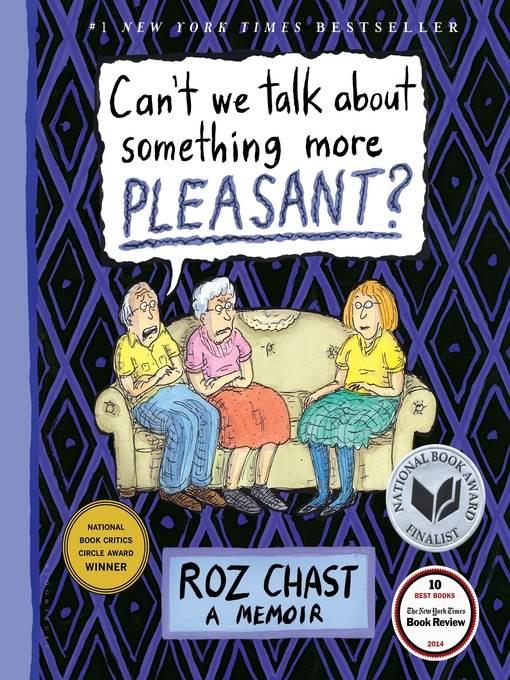
Can't We Talk about Something More Pleasant?
A Memoir
کتاب های مرتبط
- اطلاعات
- نقد و بررسی
- دیدگاه کاربران
نقد و بررسی

Starred review from March 10, 2014
“Something more pleasant” than the certainty of old age and death is what Chast’s parents would prefer to talk about, in this poignant and funny text-and-cartoon memoir of their final years. (In one cartoon, the Grim Reaper declares, “The Chasts are talking about me? Why, I’ll show them!”) Chast, a cartoonist who contributes frequently to the New Yorker, describes how her parents, George and Elizabeth, try her patience as she agonizes over their past and future. She brings her parents and herself to life in the form of her characteristic scratchy-lined, emotionally expressive characters, making the story both more personal and universal. Despite the subject matter, the book is frequently hilarious, highlighting the stubbornness and eccentricities (and often sheer lunacy) of the author’s parents. It’s a homage that provides cathartic “you are not alone” support to those caring for aging parents. Like Raymond Briggs’s classic Ethel and Ernest, this is a cartoon memoir to laugh and cry, and heal, with—Roz Chast’s masterpiece.

Starred review from February 1, 2014
A revelatory and occasionally hilarious memoir by the New Yorker cartoonist on helping her parents through their old age. Few graphic memoirs are as engaging and powerful as this or strike a more responsive chord. Chast (What I Hate, 2011, etc.) retains her signature style and wry tone throughout this long-form blend of text and drawings, but nothing she's done previously hits home as hard as this account of her family life as the only child of parents who had never even dated anyone else and whose deep bond left little room for this intruder in their midst. Yet, "the reality was that at 95, their minds and bodies were falling apart," and these two people who had only relied on each other were forced to rely on a host of caretakers, their daughter in particular, and to move from the Brooklyn apartment that had been home for half a century into a series of facilities that provided fewer and fewer amenities at escalating expense. Chast rarely lapses into sentimentality and can often be quite funny, as she depicts mortality as "The Moving Sidewalk of Life" ("Caution: Drop-Off Ahead") or deals with dread and anxiety on the "Wheel of DOOM, surrounded by the 'cautionary' tales of my childhood." The older her parents get, the more their health declines and the more expensive the care they require, the bleaker the story becomes--until, toward the end, a series of 12 largely wordless drawings of her mother's final days represents the most intimate and emotionally devastating art that Chast has created. So many have faced (or will face) the situation that the author details, but no one could render it like she does. A top-notch graphic memoir that adds a whole new dimension to readers' appreciation of Chast and her work.
COPYRIGHT(2014) Kirkus Reviews, ALL RIGHTS RESERVED.

Starred review from March 15, 2014
Chast (Theories of Everything) draws the Moving Sidewalk of Life with a sign: "Caution--drop-off ahead." The New Yorker cartoonist had vaguely thought that "the end" came in three stages: feeling unwell, growing weaker over a month or so in bed, and dying one night. But when her parents passed 90, she learned that "the middle [stage] was a lot more painful, humiliating, long-lasting, complicated, and hideously expensive" than she imagined. Chast's scratchy art turns out perfectly suited to capturing the surreal realities of the death process. In quirky color cartoons, handwritten text, photos, and her mother's poems, she documents the unpleasant yet sometimes hilarious cycle of human doom. She's especially dead-on with the unpredictable mental states of both the dying and their caregivers: placidity, denial, terror, lunacy, resignation, vindictiveness, and rage. VERDICT Like Joyce Farmer in Special Exits (LJ 9/15/10), Chast so skillfully exposes herself and her family on the page as to give readers both insight and entertainment on a topic nearly everyone avoids. As with her New Yorker cartoons, Chast's memoir serves up existential dilemmas along with chuckles and can help serve as a tutorial for the inevitable.--M.C.
Copyright 2014 Library Journal, LLC Used with permission.

























دیدگاه کاربران